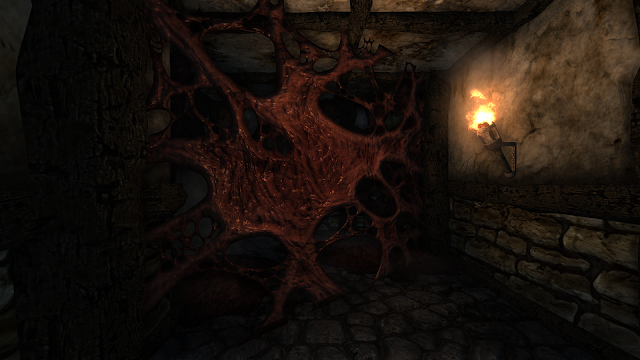SWEET FORGETFULNESS
Before returning to the horrors of Amnesia: The Dark Descent, I assumed the experience would be less stressful now that I knew what awaited me. I was dead wrong. Tell me—how does foreknowledge of being chased by deformed monsters through pitch-black corridors alleviate anything at all? During this replay, the dread of uncertainty had simply transformed into certain dread. Every time I entered a new area, the same thought struck me: Oh God no—not this place.
Designed by Frictional Games and released in 2010, Amnesia: The Dark Descent was a sleeper hit that went on to become hugely influential. As popularized by YouTubers and streamers, it weaponizes darkness and sound to torment the imagination. Some horrors are tightly scripted—desperate chases through collapsing tunnels where you must clear rubble on the fly. Others are systemic, with the game spawning monsters nearby and letting panic do the rest.
The story unfolds in Brennenburg Castle in 1839. You awaken on a stone floor, surrounded by rose petals, with no memory of who you are or how you got there. The prologue tells you only this: your name is Daniel, and you were born in Mayfair, London. Following a trail of purple liquid through dim corridors, the game teaches you its mechanics with unsettling restraint.
The castle itself radiates hostility. Corridors twist and rooms seem to shift, as if the structure were alive. Everything conspires to make you feel that you are not merely controlling Daniel—you are Daniel. The first-person perspective and exceptional sound design immerse you in whispers, groans, and distant shrieks that may or may not be real. Are these hauntings? Signs of Daniel’s fractured mind? Or memories forcing their way back to the surface?
The pacing is meticulous. Periods of quiet exploration and puzzle-solving are abruptly punctured by monster encounters. You control nearly every interaction through an elaborate physics system—opening doors, pulling levers, turning valves by hand. One particularly harrowing sequence has you slowly opening a valve-operated door while splashes in knee-deep water behind you signal that something is approaching fast.
You are defenseless. There is no combat. Survival depends entirely on evasion.
Here, Amnesia’s most inspired mechanic comes into play: hiding in darkness is your only protection—but remaining in darkness erodes your sanity. Looking directly at monsters accelerates the breakdown. Vision distorts. Daniel hallucinates, grinds his teeth, and begins to move as if wading through molasses. If his sanity collapses entirely, he falls to the floor, helpless and exposed.
Scattered throughout the castle are tinderboxes for candles and oil for your lantern—the only portable light source you have. Light restores sanity but removes hiding places. Oil is finite. Safety is temporary. You are constantly forced to negotiate an impossible balance.
This tension between light and darkness is not only mechanical brilliance—it is metaphor. As Daniel descends deeper into the castle, he uncovers documents detailing grotesque experiments tied to folklore and inhuman suffering. Frictional Games wear their Lovecraftian influences openly; even their HPL engine bears his initials. The horror is cosmic, but also intensely personal.
Unfortunately, the game begins to lose its grip in the final act—something that becomes even clearer on replay. As the mystery unravels, the pacing slows to a crawl. The scares grow less inventive. Most bafflingly, the light-versus-darkness mechanic—so central up to this point—suddenly stops mattering.
Earlier puzzles cleverly leverage the physics system and present logical solutions. Toward the end, however, they give way to opaque, supernatural inventory puzzles with little grounding. The environments open up, backtracking increases, and guidance becomes frustratingly vague. The fear dissipates.
For players hardy enough to reach the final hours, this anticlimax is palpable. The endings—of which there are several—feel emotionally thin, offering little payoff for the sustained psychological torment. Questions remain unanswered. The descent concludes not with revelation, but with exhaustion.
This is not unusual for horror. Many great horror stories falter once the unknown is explained; mystery is often more frightening than clarity. The journey matters more than the destination. But in Amnesia: The Dark Descent, the final stretch of the journey itself stumbles.
Still, Frictional Games remain my favorite Swedish developer. They have carved out a sustainable niche: their games enjoy long tails, thriving on word-of-mouth and streaming exposure rather than explosive launches. Horror, uniquely, benefits from spectatorship.
Watching a skilled streamer navigate Amnesia is like watching a horror film whose outcome changes every time. The tension is genuine. The reactions cannot be faked. Fear is contagious. It spreads.
It is no coincidence that my favorite YouTube playthrough ever belongs to this very game. ChristopherOdd—take a bow.
Like the cursed videotape in The Ring, Amnesia: The Dark Descent propagates itself. You want to experience it, even knowing it may be bad for you. It has become a classic not through graphical fidelity, but through sound. Darkness becomes a canvas for the mind, and the audio paints it with dread. A decade on, its technical limitations fade away, leaving behind something purer: the lingering echo of a broken memory and the fear of what might be lurking just beyond the edge of the light.








Comments
Post a Comment